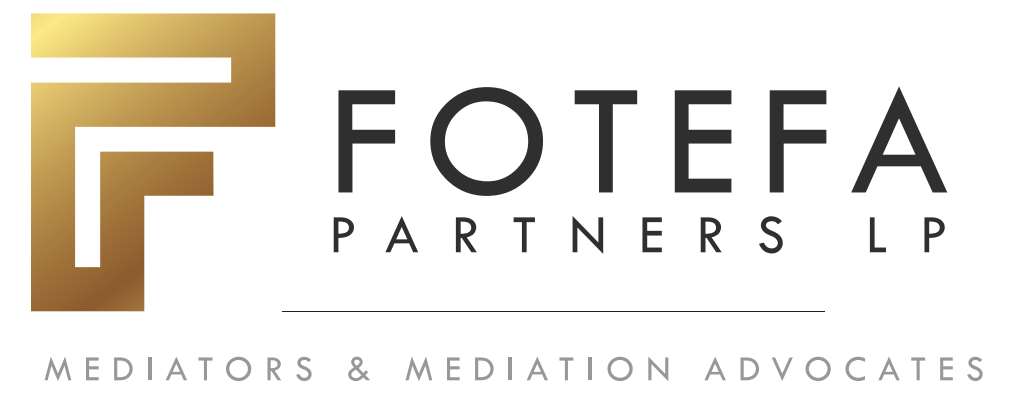- Alternative Dispute Resolution: includes the entire range of alternatives to litigation that involves third-party intervention to assist in the resolution of a dispute.
- Mediation: is a process in which an impartial third party (the mediator) facilitates communication and negotiation and promotes voluntary decision making by the parties to the dispute.
- Mediation Advocate: is a lawyer or other professional advocate who represent clients at mediation. He is obligated to assist clients in evaluating and preparing settlement options.
- Arbitration: is a simplified means of trial without the technicalities of litigation. It empowers the third party to decide the outcome of a dispute.
- Conciliator: is a process where the parties to a dispute use a neutral third party (a conciliator) who meets with both parties separately in an attempt to resolve their differences.
- Negotiation: is an economical and satisfactory way of resolving disputes and it entails communication for the purpose of persuasion.
- Panel of Neutrals: refers to the list of Mediators, Arbitrators, and Neutral Evaluators already screened and accredited by the LMDC to provide mediation and arbitration services at the LMDC.
- Settlement Agreement: means the terms of settlement or memorandum of understanding or any agreement between disputing parties and which would be enforced as the Consent Judgment of the court upon due endorsement by an ADR Judge or Magistrate and registration at the Registry of the High Court of Lagos, Lagos state.
- Settlement Week: means a week set aside by the Chief Judge of the Lagos High Court for specific courts to clear the backlog of cases through means, which include referral to the LMDC for possible resolution through Mediation, Arbitration, Neutral Evaluation or any other ADR procedure.
- What are the benefits of ADR?
ADR processes tend to be informal, speedy, economical, flexible and less upsetting than litigation.
- Is any agreement reached at Mediation enforceable?
YES, at the LMDC, settlements are enforceable. Section 19 of the LAGOS MULTI-DOOR COURTHOUSE (LMDC) 2007 provides that upon the completion of an ADR proceeding, settlement agreements which are duly signed by the parties shall be enforceable as a contract between the parties and when such agreements are further endorsed by an ADR Judge, they are enforceable as consent Judgement of the High Court of Lagos State.
- Will suggesting Mediation to the other party not seem as a sign of weakness or a perception that I have a bad case?
Not in the least, suggesting Mediation is neither a sign of weakness nor an indication of a bad case. On the contrary, it is an indication of exposure and an understanding of the 21st-century practice and business ethics. Your suggestion would be in accordance with Section 18 of the LAGOS MULTI-DOOR COURTHOUSE (LMDC) 2007 which enjoins disputing parties to consider seriously the adoption of ADR procedures for resolving disputes.
- If the other party refuses to submit to Mediation, what do I do?
Under the LMDC Law, the ADR Judge is empowered to require the attendance of the defaulting party before him/her to explain the reasons for their neglect or refusal to submit to ADR. Thereafter, he may make orders or give directives as he deems fit in the circumstances.
- If we do not reach a settlement at Mediation, what do I do?
As the “doors” at the LMDC operate as a continuum, failure of the parties to reach a settlement at mediation may lead them into Early Neutral Evaluation or Arbitration, as appropriate.
- Is it true that the cost of Mediation is more than Litigation?
It is not true. Not only is the cost ultimately cheaper, the process saves time and relationships.
- What is the lawyer’s role and responsibility in Mediation?
The lawyer represents his client as a Mediation Advocate and drives the settlement initiative. He is obligated to assist clients in evaluating and preparing settlement options. If no settlement is reached, then the cases can either be referred to Arbitration or taken to court.
Footnotes:* Standing Conference of Mediation Advocates (SCMA) *The Lagos Multi-Door Courthouse Law (LMDC) 2007* The LMDC Practice Direction on Mediation Procedure* The Multi-Door Courthouse Code of Ethics for Mediators* Guidelines For Enforcement Procedure *Guidelines for Court referrals to Alternative Dispute Resolution *Principles of Alternative Dispute Resolution by Stephen Ware *Effective Mediation Advocacy by Andrew Goodman.*The Lagos Multi-Door Courthouse Neutrals’ Handbook.

